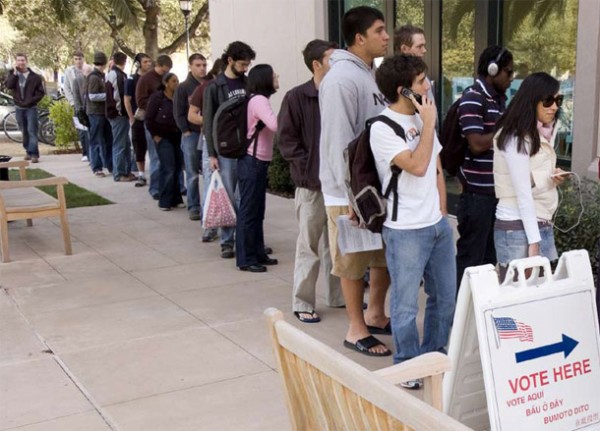Young Voters Becoming More Independent


Voters are becoming more independent of conventional partisan politics, and young voters in particular are getting harder to squeeze into a red or blue box.
While many voters may feel they have to choose whether they are socially and economically "liberal" or socially and economically "conservative," more and more young voters are deciding that they can pick and choose their values and how government should work irrespective of party platforms. As an indicator of this trend it look like young voters are abandoning Obama and Romney both:
Finally, in a head-to-head matchup with Romney, Obama wins only 41 percent support, a significant drop from actual votes from this group in 2008.
Although this generation is not as supportive of President Obama and Democrats as they may have been in the historic 2008 campaign, this in no way implies that the Republican Party has successfully captured the hearts, minds, and votes of millennials.says Harvard Institute of Politics polling director John Della Volpe."Millennials" are breaking the mold in other ways. This decline in partisanship is giving rise and prominence to world views previously kept on the margins. One such group are libertarians. Writing at VICE, Vinnie Rotondaro, discusses his two friends as examples of these new, young libertarian voters.
Most people, when they think of a libertarian, picture some kind of outsider, a weirdo– a lip-smacking Texas fireworks salesman in a ten-gallon hat, or someone like that sloshed constitutionalist whose DUI arrest video went viral last year. I’ve often heard liberals write libertarians off as “idiots.” But Danny and Matt are two of my best friends, and they aren’t idiots. They’re smart, thoughtful guys... Both voted for Obama in 2008. Now they can’t stand him. But they’re not so keen on Romney or the political right, either. Danny and Matt are fed up with everything, the whole political system.
These Danny and Matt libertarians comprise a growing group of voters that have decided they can be socially tolerant and also be concerned about economic freedom and the country's growing debt. Voters are softening up on social issues, but becoming more concerned about government management of the economy. Emily Ekins of the Cato Institute puts it this way:
If people do change over time, they tend to become more economically conservative. But that’s typically not the case with social issues. So what we've seen is something like a permanent shift, starting now, over social issues. If Republicans want to get those votes, she said, they’ll need to soften their stance on social conservatism. If Democrats want them, conversely, they’ll have to clamp down on being so economically liberal.
If the major parties want to survive they are going to have to play a different ball game. But judging by how the Republican Party establishment has responded to Ron Paul's revolution within the party to bring libertarian and independent policies to the forefront, the GOP is not yet ready to accept the new political paradigm.
But let's not forget the Occupy Wall Street movement, which is notable for being anti-partisan. Unlike the Tea Party movement, to which OWS is often compared, there have been no "Occupy candidates" and no movement to "take back" the Democratic Party. There is no "Democratic Ron Paul" leading them.
They are something like a resuscitation of the Bush-era anti-war movement that rolled over dead when Obama came to Washington. While some on the left apologize for and defend more or less anything that Obama does, blinded by uncritical partisanship, Occupy has targeted Obama and has even "mic checked" him:
"Mr. President: Over 4000 peaceful protesters have been arrested. While banksters continue to destroy the economy with impunity. You must stop the assault on our 1st amendment rights. Your silence sends a message that police brutality is acceptable. Banks got bailed out. We got sold out."
And there is the key statement summarizing all of it: the Tea Party, Ron Paul's Revolution, Occupy Wall Street, all of these populist movements: "Banks got bailed out. We got sold out." What all of these independent movements have in common is a heightened sense that something is very wrong with the way the economy has been managed.
Some think that it has been mismanaged, others see government management of the economy as the problem, but they all are focusing on the economy and believe that the parties that they traditionally would have belonged to do not have the answer. Social issues are becoming less and less polarizing while economic issues are becoming more and more unifying.
Many political scientists have asserted that independent voters are a kind of urban myth. This is because most independent voters reportedly do have a party preference. But having a party preference does not make a voter any less independent. Independent voters are among the most pandered to demographics, but their concerns never seem to be addressed by public policy. That's why there are so many different independent political movements now.
The Tea Party may run Republican candidates, but they are not afraid to oppose a Republican incumbent that does not line up with them even if it means that the Democrat wins the general election. Ron Paul's movement may be working within the GOP primarily, but they act and vote independently of the party's establishmentarians and are not likely to support a nominee that is out of sync with their values. They are not partisan and will sooner vote for Libertarian Party candidate Gary Johnson than Mitt Romney.
Occupy Wall Street will be difficult to placate with progressive rhetoric, but no follow through in terms of substantive policy reforms. Those who believe in the "Myth of the Independent Voter" theory miss the fact that two people can vote in a party primary and still be very different kinds of voters. If the major parties want to survive then they will have to adjust.



